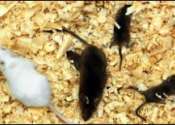Down syndrome neurons grown from stem cells show signature problems
Down syndrome, the most common genetic form of intellectual disability, results from an extra copy of one chromosome. Although people with Down syndrome experience intellectual difficulties and other problems, scientists ...
May 27, 2013
0
0

